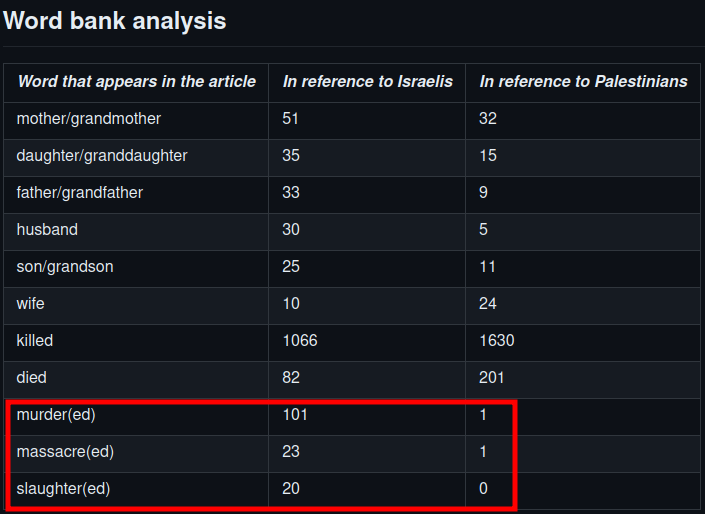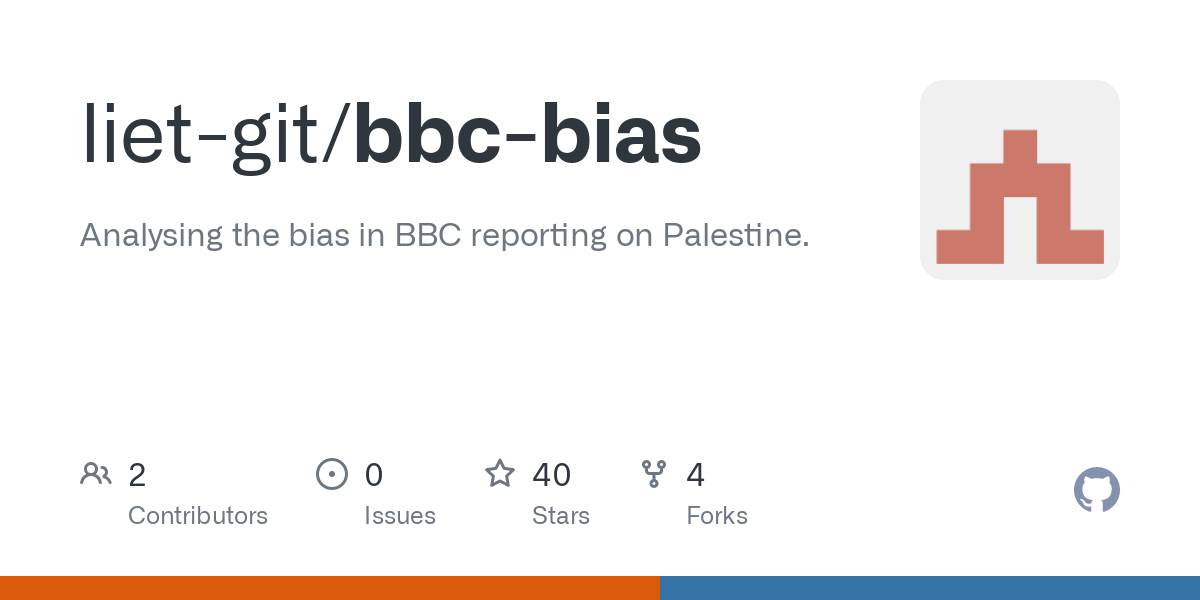Overview
This work aims to shed light on bias in BBC reporting on Palestine in a way that is both transparent and reproducible. We analyzed a total of 600 articles and 4000 livefeed posts on the BBC website between October 7, 2023 and December 2, 2023 in an attempt to surface the systematic disparity in how Palestinian and Israeli deaths are treated in the media.
The pipeline of the study is as follows:
We obtained source articles and livefeed posts from the BBC website by selecting relevant topics (see below for full list) and
We parsed the individual sentences using the Stanford CoreNLP natural language processing
Using the results from step 2, we identified sentences with mentions of death and manually tagged each one of them as referring to Palestinians, Israelis, neither or both. None of the tagging was performed automatically.

They’re missing the classics!
Kids/children vs people under 18
Hostage vs prisoners
As in *The Israeli hostages are mostly women and children, the Palestinians prisoners are mostly women and people under 18", in both cases they’re people that have nothing to do with the conflict, in both cases some of them aren’t adults.
Or maybe it’s because the Israelis, Thais, French, etc., were kidnapped from their homes for the express purpose of wartime negotiation, i.e. hostages. The Palestinians are all held in connection with crimes, including convictions for violent crimes.
If anything, this has exposed major injustices in the Israeli criminal system, such as people being held for long periods of time without charges, unrealistically high conviction rates, etc.
However, let’s also not buy into the Hamas line that the two groups are equivalent. That’s just an attempt to whitewash their Oct 7 atrocities.
That’s not true. Israel routinely detains Palestinians including children without charge.
https://www.bbc.co.uk/news/world-middle-east-67600015
Thousands are held without charge and for indefinite periods:
*As of November 1, Israeli authorities held nearly 7,000 Palestinians from the occupied territory in detention for alleged security offenses, according to the Israeli human rights organization HaMoked. Far more Palestinians have been arrested since the October 7 attacks in Israel than have been released in the last week. Among those being held are dozens of women and scores of children.
The majority have never been convicted of a crime, including more than 2,000 of them being held in administrative detention, in which the Israeli military detains a person without charge or trial. Such detention can be renewed indefinitely based on secret information, which the detainee is not allowed to see. Administrative detainees are held on the presumption that they might commit an offense at some point in the future. Israeli authorities have held children, human rights defenders and Palestinian political activists, among others, in administrative detention, often for prolonged periods.*
That’s exactly what I said in my reply. Thanks for providing additional links.
You’re welcome.
This last of your comment is misleading as many of them are held for no reason at all.
The Palestinians are all held in connection with crimes, including convictions for violent crimes.
Also Palestinians are detained and processed by military courts so they do not benefit from civil rights that Israeli citizens enjoy
Differentiating between hostages and prisoners makes absolute sense, the two words mean different things and have each their use case in this conflict. But if (I don’t follow the news reporting about this conflict too much unless I’m in a discussion about it) there is a difference in referring to either sides children as “people under 18” while the same is not done for the other side that is, imo, conscious or subconscious manipulation by the news agency. People react strongly to the word children and replacing that with “people under 18” would significantyl diminish that impact. Again, not sure if applicable as I’m not well read on the news articles but if such distinction takes place at all it is worth looking into how often these terms are used for either side comparatively (ie how many % of the time israeli children are referred to as “people under 18” and how many % of the time palestinian children are referred to as “people under 18”. Absolute numbers mean little there since one side could just be reported on a lot more, which in itself could be bias)
I think we should apply the same scrutiny to other websites and reveal their bias as well. But yes, it is interesting to note that killed was used 1066 times for Israel’s 1200 victims and only 1630 times for more than 22K killed by Israel’s strikes, that’s to some extent because every time BBC was reporting on some civilian casualties on the Palestine’s side they were feeling obliged to reiterate the reason of those killings.
Whether killing 22K, many of whom are kids and women in retaliation to 1200 on the other side is justified is a completely different story though
There was another NLP study done three months ago, which this study is based on. That study focused on three other major US newspapers and their bias. Those three were:
-
The New York Times (seemingly the biggest offender)
-
The Washington Post
-
The Wall Street Journal
It would be great to have some kind of unified framework that could ingest the link to a news site and use NLP to fully analyze their language, though I suspect that it’s difficult to fully automate, as the existing studies needed to do some data cleaning by hand.
-
This is excellent work!
Seems like the analysis is starting from the hypothesis that the BBC is biased, while a better scientific inquiry is “IS the BBC biased”.
Noooooooooo. No.
Everyone and every organization has a bias. Even a “neutral” bias is a bias. Finding out which way their bias leans is good info to figure out.
No?
Positing something and validating the theory through research is appropriate scientific inquiry.
It’s obvious to many people that the BBC had a bias, there was no need to ask the question when they could answer the question.
If you disagree, feel free to present a compelling study as to why you think so. That’s how the scientific method works.
I fail to see your point. Whenever you have a theory you either have a suspicion of some severity that what you are testing against is the case. Depending on that severity your own process will be biased and being upfront about what you are trying to do is far better practice than trying to hide it by appearing more neutral than you actually are. If anything these researchers are doing everything correct, people can now go ahead and check their process for bias if the suspect so based on the findings, if they had presented themselves as a neutral party some would be more hesitant to do so since the researchers did not display any inherent bias.
It is perfectly fine to start from a biased perspective if you are open about that bias (which is the case here) and don’t try to argue against people if they show that your process was tainted by that bias (remains to be seen on two counts: was this researched biased and if so how would the researchers responds). But having a bias in itself is not inherently wrong, if it were none of modern science would pass that test.
A hypothesis is “I think x is true” or “x will happen if I do y.” It is a conclusory statement based on existing knowledge that then has to be proven and is one of the first things you learn to do in science. Asking “what happened to x” or “what is x” is not a hypothesis, it’s an open-ended inquiry. While both are useful, the hypothesis is specifically part of the scientific method. You’re proving or disproving smaller conclusions to answer a broader open-ended inquiry.
I’m not seeing any mention of how they parsed out the data to account for reiteration of past reporting.
Let’s assume a different situation, one where Individual A slaps Individual B in a high school, and the incident is reported on in the schools newspaper. Initially, there is going to be a set of wording used: “B was the victim of an attack when A slapped them.”
You now have the first instance of “B was the victim” and “A slapped B”. Now let’s assume B slaps A the following day, resulting in a new newspaper story: “As we remember from yesterday, where B was the victim of a slapping by A. Today, B struck A.”
Now we have an instance of “B was the victim” and “A slapped B” but we have the first instance of “B struck A”. We’re two reports in, and using the methods described we have observed a bias.
Over the following days, similar retributive actions are carried out by both A and B. However, the root event doesn’t change. Each article is prefaced with something akin to “As we remember from previous days, where B was the victim of a slapping by A…” This doesn’t necessarily indicate bias, it can also be attributed to keeping the story grouped.
Is that what’s going on? I have no idea, and I’m not at all claiming that is the case. In fact, I don’t routinely pay attention to news from the BBC at all. But the lack of this being mentioned did make me wonder if it was factored in. That said, some of that language choice is obviously an issue. Especially “children” vs “people under 18”.
That said, if anyone sees something I missed in the github, I am more than happy to correct this comment to reflect my misunderstanding.
No the wording used for the killing of Palestinians is fundamentally completely different. They just “died” while israelis got “brutally indiscriminately slaughtered”
I fail to understand the results, is it possible to formulate it for simple folks like me?
There’s a lot of analysis about frequency but to me this is one of the most important statistics:

Does that imply BBC bias towards favoring Israel? Or is it weighted by ground truth somewhere? What I mean by this i expect there is lots of mentions of “murdered” israelis in the week of Oct 7 compared say towards the last week of November, given when the actual events took place. Frequency is not that informative without a distribution to compare it to.
Yes, this Owen Jones video explains it in more detail
Another clear example from the CNN which recently had a whistleblower that leaked that the IDF censors their content
Here is an alternative Piped link(s):
Another clear example from the CNN
Piped is a privacy-respecting open-source alternative frontend to YouTube.
I’m open-source; check me out at GitHub.
deleted by creator
When talking about Israelis killed, the BBC used the word “grandmother” 52 times, while it used it 32 times when describing Palestinians killed. Likewise, it used the word “murdered” 101 times for Israelis killed while only once when talking about Palestinians.
The rest of the rows are similar.
The intended takeaway is that Palestinian deaths are reported blandly, while Isrseli deaths are painted in a much more endearing light.
Granted, there are some considerations of possible biases towards the results. For example, maybe there were less articles about Palestinians and as such less opportunities to use the same word. Maybe there isn’t enough information flowing out of Gaza as opposed to Israel or BBC. There are also the more extreme options of the authors of the data trying to paint the BBC negatively and the BBC strategically painting Israeli deaths as more tragic and brutal than Palestinian desths.
Which option you take as the most plausible is your call tho.
This is more than just bias, it’s outright racism.
Is this treating a few deaths as a tragedy and many as a statistic?
The word choice of “brutally slaughtered, murdered” etc is very different too. When Palestinians do something they get a lot of adjectives and people were massacered. When the IDF does something way worse someone “lost their life”.










